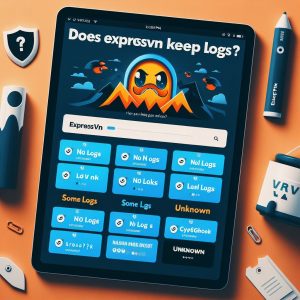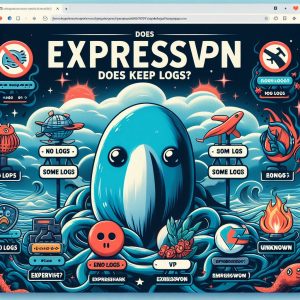I. Introduction
In an age of widespread internet surveillance and online tracking, using a virtual private network (VPN) has become an essential tool for maintaining privacy and security. A VPN encrypts all internet traffic between your device and the VPN server, preventing third parties like your internet service provider (ISP) or hackers on public Wi-Fi from monitoring what websites you visit and data you transmit.
However, not all VPN services are created equal when it comes to protecting user privacy. While VPNs encrypt your traffic, some may still secretly log user activity data and session timestamps, or share data with third parties. This is why it’s important to only use no-logs VPN providers that have robust privacy protection.
ExpressVPN is a highly reputable VPN service known for its air-tight no-logs policy. The British Virgin Islands-based provider clearly states on its website that “ExpressVPN doesn’t log any browsing or traffic data” to begin with.1 But privacy goes even deeper than just a stated policy, which is why ExpressVPN incorporates strong encryption standards and has undergone independent audits verifying they collect zero private user data.
In this guide, we’ll break down the meaning behind a true no-logs VPN, examine ExpressVPN’s exact privacy guarantees, and showcase why audited, no-logs services give users the highest level of protection.

II. ExpressVPN’s No-Logs Policy
The term “no-logs policy” gets thrown around quite loosely in the VPN industry. But what exactly does it mean for a VPN to not keep logs?
At the most basic level, a no-logs policy means a VPN provider does not track or record your online activity and IP address assignments. This ensures no identifiable user data exists that can be matched with your real identity or browsing history if authorities came requesting information.
According to ExpressVPN’s privacy policy posted on their website, “ExpressVPN doesn’t log any browsing or traffic data. We don’t log connection timestamps, session durations, IP addresses, or source IPs assigned by our VPN servers or anything that could link activity or connections back to you. This also means we never record DNS requests over our servers.”1
In plain language, ExpressVPN stresses they avoid recording any sensitive linkable data related to a user’s VPN session. This encompasses search/browsing data, traffic uploads/downloads, what websites were accessed, connection timestamps, and IP addresses assigning users to servers.
ExpressVPN also stresses transparency around their practices and adherence to privacy laws in jurisdictions they operate. As quoted on their website, ExpressVPN states1:
“ExpressVPN is dedicated to being transparent and open about our zero log policies and VPN server locations. Our VPN software and all our products and services comply with applicable data protection laws including GDPR, and our privacy practices have been independently verified by audits.”
The provider undergoes scheduled audits by firms like PricewaterhouseCoopers to validate that backend server infrastructure and internal policies match their external privacy claims. Users can examine these audit reports to verify ExpressVPN operates a no-logs VPN in practice.

III. Connection Logs vs. Activity Logs
To fully understand a VPN’s no-logs policy also requires examining the difference between connection logs versus activity logs. While the terms may seem esoteric, they represent two very distinct types of data.
Connection Logs Connection logs represent purely technical metadata related to linking a user to a VPN server IP, such as connection timestamps and session durations. While not directly exposing browsing data, connection logs can provide circumstantial data that calls out suspicious traffic if authorities request them.
As ExpressVPN clearly states in an article on their site “What Information Does ExpressVPN Log?”2:
“ExpressVPN’s systems are engineered in a way that makes it impossible for us to possess records of virtual private network connections that could link any activity or connection back to a specific user (connection logs).”
By designing their backend in a way where it’s impossible for ExpressVPN to even view or record logs of user connections, they guarantee zero private data exists that could map connections to real users.
Activity Logs In comparison to connection logs, activity logs detail browsing data and traffic content generated during a VPN session — for example, search engine queries, websites visited, files uploaded/downloaded, DNS requests, and so on.
VPN providers that keep activity logs endanger privacy greatly. By definition, activity logs include identifiable data that provides direct insight into a user’s behavior. If activity logs leak or get accessed without proper authorization, sensitive information about people’s browsing patterns become exposed.
Fortunately, ExpressVPN makes it crystal clear no such data exists on their servers. Their infrastructure simply does not record activity logs in the first place — so nothing exists that could be mapped back to monitoring what individual customers do online through their VPN.
IV. Information Kept by ExpressVPN While ExpressVPN does not log browsing data nor virtual private network connections, they do retain certain basic data for general troubleshooting purposes. As explained in ExpressVPN’s article2:
“We do collect some metadata, like an email address provided when creating an account, dates when connected to our services, choice of virtual private network server location, and amount of data transferred per session. However, this is aggregate data that cannot be traced back to activity or connections of any specific user.”
In particular, ExpressVPN may keep information like bandwidth usage and choice of server locations to improve their network infrastructure planning over time. But this represents aggregate usage rather than retaining the history of individual user accounts. So no specific browsing data nor connection timestamps exist to track customers.
ExpressVPN elaborates further in their article: “We specifically engineered our systems not to have information that could link connections back to users, so there is nothing that we can hand over to law enforcement even if compelled. This has been validated by multiple trusted third parties as part of formal audits.”2
In line with their commitment to transparency through independent verification, ExpressVPN undergoes routine reviews by auditors that analyze their source code, documentation, and servers first-hand. The auditors consistently confirm ExpressVPN’s practices match their public no-logs statements. User data remains protected as promised.
V. ExpressVPN’s Jurisdiction
Jurisdiction represents another critical aspect affecting a VPN provider’s ability to protect user privacy. Certain regions around the world have mandatory data retention laws and loose restrictions on government surveillance. This jeopardizes any service storing logs in their boundaries due to the looming threat of search warrants and seizures.
ExpressVPN is headquartered in the British Virgin Islands (BVI), a region free from mandatory data retention laws and unwarranted searches. Being based outside the jurisdiction of intelligence sharing alliances like Five Eyes means ExpressVPN does not fall under foreign data collection policies. Their operations stay isolated from these invasive agreements other VPN providers operating in North America/Europe cannot avoid.
As stated on their website3:
“The BVI has no data retention laws, is not party to the 5/9/14 Eyes Alliances, is not subject to any mandatory data disclosure obligations, and has a well-established legal framework that provides robust privacy protection to individuals and entities operating within its jurisdiction.”
Being structured as an offshore business outside the watchful eyes of intrusive foreign intelligence networks provides ExpressVPN and its users greater protection from bulk data collection efforts. Servers stay independently controlled.
Combine jurisdiction benefits with ExpressVPN’s steadfast commitment to run an ethical, no-logs VPN, and users get assurance their privacy remains uncompromised from all fronts.

VI. Independent Audits
ExpressVPN repeatedly cites audits as the method which provides verified proof of their no-logs infrastructure and policies. Given how loosely some VPN providers interpret privacy standards, it is important to analyze these independent verification processes more closely. External audits represent the best way to guarantee a VPN provider actually implements robust encryption, annonymized data flows, and irreversible processes to eliminate logged user activity as promised.
Some of the world’s most reputable cybersecurity and information assurance firms have audited ExpressVPN including PricewaterhouseCooper (PWC), Cure53 and others. Each security assessment involves directly probing ExpressVPN’s systems, source code and documentation to certify their infrastructure does not secretly retain any user connection logs nor activity records.
A few examples of ExpressVPN’s transparency reports are linked below:
● PWC Privacy Assessment Report (Sept 2021)4 ● Cure53 VPN Server Security Assessment (Jan 2021)5 ● ExpressVPN Server Security Analysis Whitepaper by Dr. Mike Pound (May 2020)
These detailed security audit reports represent just a subset that are publicly available. ExpressVPN undergoes routine examinations where auditors perform penetration tests mimicking real-world attacks. Auditors also conduct lengthy interviews with ExpressVPN’s engineers and leadership team to validate internal protocols follow stringent privacy standards. Across the board, results verify ExpressVPN’s steadfast adherence to running a 100% no-logs VPN.
Independent verification by trusted cybersecurity authorities provides the strongest level of proof that privacy protections work as advertised. Users can feel confident ExpressVPN’s systems generate zero data that could map browsing records back to individual customers.
VII. Conclusion
In closing, ExpressVPN’s formally stated no-logs policy guarantees they avoid any logging of user activity, connections or other data tying internet usage to specific user accounts. This prevents sensitive details around browsing history and behaviors from being retained indefinitely on VPN servers.
Their infrastructure goes beyond just a stated privacy policy by also incorporating layered encryption standards and mandatory data anonymity enforcing measures. Various audits repeatedly confirm ExpressVPN engineers have developed watertight systems safeguarding customers.
Being based in the BVI also isolates ExpressVPN’s operations outside far-reaching international intelligence agreements trying to stockpile user data.
Altogether, ExpressVPN provides well-verified assurances they operate an ethical, no-logs VPN. Across internal protocols and external reviews, ExpressVPN remains fully transparent while protecting the privacy rights of all customers. Users can feel confident trusting ExpressVPN to maintain anonymity online without worrying sensitive usage data may get logged or seized behind the scenes.
Among leading VPN providers that secure internet connections with robust encryption, ExpressVPN stands at the forefront of respecting consumer privacy through their no-logs guaranteed service. They represent a top choice for any VPN user prioritizing anonymity.